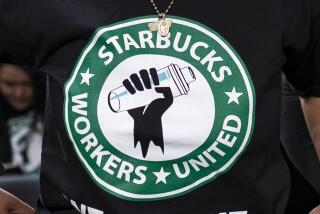Krispy Kreme Blames Ex-Execs
- Share via
CHARLOTTE, N.C. — Most of the blame for the financial woes of snack maker Krispy Kreme Doughnuts Inc. lies with two former executives who tried to “manage earnings” to meet Wall Street’s expectations, according to a special committee report issued Wednesday.
Neither Scott Livengood nor John Tate, former chief executive and chief operating officer, respectively, are still with the once-highflying company. It’s not clear whether their departures, and the recommendation Wednesday by the committee, made up of independent directors, to restate past earnings downward by $25.6 million, will return the luster to the former Wall Street darling known for its tempting “hot now” treats.
Morningstar analyst John Owens called the report a “small but significant step in restoring investor confidence.” But Owens added that the Winston-Salem company still must grapple with double-digit sales declines at its factory stores and financial problems with its franchisees.
The company faces several lawsuits, including one that alleges workers lost millions of dollars in retirement savings because executives at the company hid evidence of declining sales and profit. Krispy Kreme also is the target of a federal criminal inquiry in New York and a Securities and Exchange Commission probe into financial irregularities.
Those investigations could stall the company’s effort to return to profitability, Owens said. In June, the company said it would miss the deadline for filing financial results for the quarter that ended May 1, and that it expected to post a loss.
Krispy Kreme Chairman James Morgan sounded hopeful in a statement Wednesday.
“The completion of the special committee report represents an important step forward for Krispy Kreme, both in understanding what occurred and in providing the framework for our upcoming restatement of our financial statements,” he said. “Krispy Kreme is a powerful brand, and we believe we are making progress every day in getting the company back on track to realizing its full potential.”
The company’s stock, which traded for $105 in November 2000 before a pair of two-for-one stock splits, rose 15 cents to $7.30.
Attempts to contact Livengood and Tate were unsuccessful. The report said the two executives failed “to establish the management tone, environment and controls essential for meeting the company’s responsibilities as a public company.”
The report said company executives and other employees who had substantial involvement in the accounting errors had left Krispy Kreme, but it also determined that the company should not sue any current or former directors or executives.
The report also found that none of the former and current Krispy Kreme executives interviewed on behalf of the committee acknowledged an effort to boost the company’s stock price by manipulating financial transactions. But, the report stated, “the number, nature and timing of the accounting errors strongly suggest that they resulted from an intent to manage earnings.”
Government investigators will be more able to determine whether there was criminal intent, the report said.
More to Read
Inside the business of entertainment
The Wide Shot brings you news, analysis and insights on everything from streaming wars to production — and what it all means for the future.
You may occasionally receive promotional content from the Los Angeles Times.










